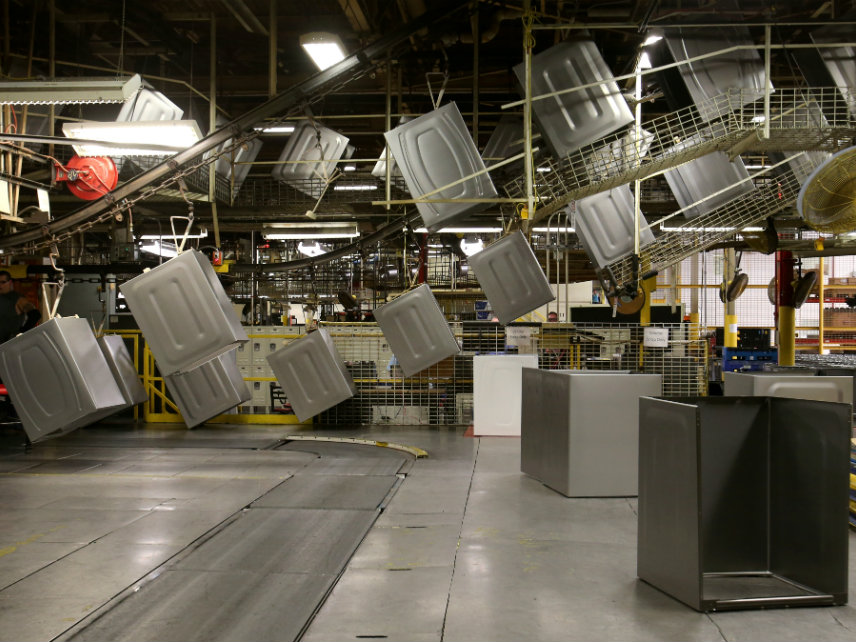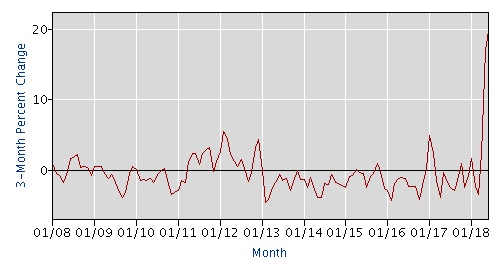Whirlpool Took Tariffs for a Spin, Ended Up With Tumbling Sales
Tariffs let the government pick winners and losers-but sometimes even the winners get hung out to dry.

Before the White House was slapping tariffs on Chinese imports, before its tariffs on imported steel and aluminum, the opening salvo in what would become President Donald Trump's trade war was fired without hardly any notice. In January, the administration imposed tariffs on imported washing machines, with the duty ranging from 20 percent to 50 percent along a sliding scale.
That sounded like great news to the Whirlpool Corp., an American appliance manufacturer. "This is, without any doubt, a positive catalyst for Whirlpool," CEO Marc Bitzer said on an investor conference call, according to The Wall Street Journal.
Almost every government intrusion into the economy will create winners and losers, but tariffs do so in espescially direct ways. And it was no accident that Whirlpool was a "winner" of the Trump administration's first foray into trade protectionism. The company had lobbied hard for the trade barriers, telling the United States International Trade Commission that foreign companies like Samsung and LG were undercutting it on price. The tariffs would "create a level playing field for American workers and manufacturers," Whirlpool officials told the commission. They would allow the domestic manufacturer to hire 1,300 more workers at its Ohio plant, the company said.
Now, the Journal reports, things look quite a bit different. Whirlpool's share price is down 15 percent over the past six months. (Fellow washing-machine makers Samsung and LG have seen their stock prices fall as well.) Even with a boost from the new corporate tax rules, Whirlpool's net income was down $64 million in the first quarter of 2018 when compared with the same period of the previous year.
Why? Because tariffs on steel and aluminum have increased the cost of Whirlpool's raw materials, essentially wiping out the advantage it gained by having its foreign competitors penalized.
For consumers, it means the price of a new washing machine—whether made in Ohio, South Korea, or China—has jumped by about 20 percent in just a few months. That's pretty much exactly in line with what analysts predicted in January when the tariff was announced.

"We have repeatedly stated that this tariff is a tax on every washing machine buyer in the U.S.," a Samsung spokesman told the Journal. "Since the tariff was implemented, U.S. consumers have paid more for their washing machines across all brands."
While the tariffs can be credited with pushing Sumsung to open a small manufacturing facility in South Carolina (LG is reportedly considering doing the same), the costs imposed on consumers seem to far outweigh the potential for new jobs. That's something that economists have generally agreed on ever since the Trump administration started racheting up barriers to trade: Tariffs may create some jobs, but they'll cause more to be lost.
Similar stories are playing out in other sectors of the economy where the Trump administraton has deployed protectionist policies. The 25 percent tariff on imported steel, for example, is raising prices and forcing layoffs, but it is not resurrecting steel towns in the Rust Belt.
When it comes to tariffs, the losers lose and often the winners lose too. And consumers lose most of all.
Editor's Note: As of February 29, 2024, commenting privileges on reason.com posts are limited to Reason Plus subscribers. Past commenters are grandfathered in for a temporary period. Subscribe here to preserve your ability to comment. Your Reason Plus subscription also gives you an ad-free version of reason.com, along with full access to the digital edition and archives of Reason magazine. We request that comments be civil and on-topic. We do not moderate or assume any responsibility for comments, which are owned by the readers who post them. Comments do not represent the views of reason.com or Reason Foundation. We reserve the right to delete any comment and ban commenters for any reason at any time. Comments may only be edited within 5 minutes of posting. Report abuses.
Please to post comments


"Since the tariff was implemented, U.S. consumers have paid more for their washing machines across all brands."
Time to bring back paper clothes to go with the paper straws.
I make up to $90 a hour working from my home. My story is that I quit working at walmart to work on the web
and with a little exertion I effectively acquire around $40h to $86h? Someone regarded me by imparting this connect to me,so now I am trusting I could help another person out there by sharing this connection.
Attempt it, you will love it!...... https://1kdaily.us
I find import tarriffs to be their own special flavor of annoying. Why should the government be entitled to a cut just because I choose to buy something from a foreign supplier?
I mean, if anything, at least for logical consistency, the tarriff should be handed over to the competitors of the people I bought my foreign item from. It's still ridiculous from a market perspective, but at least it then notionally accomplishes what the tarriff is trying to do.
"...without hardly..."
Seriously?
Eric, keep up the good work. We can talk economic theory until we're blue in the face, but examples of how these tariffs are hurting industry and consumers are the only ways that we'll affect actual change.
"Let me tell you child about the way things used to be", grandpa said. "Back in my day the Republicans were against taxes. They might have all be blowing smoke when it came to markets, but they were unwavering when it came to their opposition to taxes."
"Gosh, grandpa! Then what happened?" Junior asked.
"I cant' remember. I was too busy bashing Gary Johnson to pay much attention. But the next thing we knew the Republicans were taxing stuff as fast as they could."
We just bought a washer/dryer set a month ago. They were deeply discounted even though I don't believe the "original" price. They're GE, by the way, and supposedly "made in the USA". I would have gone with Electrolux (Sweedish), but they were about $300 more per unit, so it would have been $600 more to get them. Anyway, they GEs are fine (so far).
We've had our GE washer for 10 years now and no problems. My aunt has a much newer Electrolux and it is leaking already-the brand may be Swedish but I am pretty sure it was made in China.
Interesting. Guess I'm glad I didn't go for the fancier option. It sucks because we got rid of an old 80s looking Kenmore washer (we moved to a new house and I'm not using someone's old top loading washer and I want a steam function, dammit). That thing was built like a tank and I'm sure would last another 50 years. I hope it wasn't just scrapped, but I fear that it was.
And yeah, after using the GE for a while, it does seem like it's very sturdy and reliable. I hope I'm not jinxing it.
What self-respecting Republican doesn't support domestic inflation to counter unions who have priced themselves out of the labor market?
While the tariffs can be credited with pushing Sumsung to open a small manufacturing facility in South Carolina (LG is reportedly considering doing the same), the costs imposed on consumers seem to far outweigh the potential for new jobs. That's something that economists have generally agreed on ever since the Trump administration started racheting up barriers to trade: Tariffs may create some jobs, but they'll cause more to be lost.
Seem to far outweigh, or does far outweigh.
In principle, of course, we want freer trade but since Donald Trump is a New York Democrat this seems consistent with his bent worldview and that of mainstream Democrats in the U.S. and even the majority of the Republican party.
I'm curious if it does actually outweigh, though, on utilitarian grounds since this article seems to want to make a utilitarian argument without actually doing so. Burying this little caveat at the bottom seems to invalidate most of the rest of what's said here.
Seems to invalidate or does invalidate?
In principle, of course, an article that advances several arguments wouldn't be completely undermined by one turn of phrase, but that seems consistent with the worldview of commenters who grow gardens out of thimbles rather than provide support for their counterarguments.
I'm curious if it does actually invalidate, though, on factual grounds since this comment seems to want to argue that a handful of jobs in South Carolina might outweigh the higher prices that consumers nationwide are paying without actually doing so. Burying this little caveat at the bottom seems to indicate that the comment isn't really making an argument at all.
Usually the burden of proof is on the person making the claim, but since you're Hugh that might be beyond your understanding.
I happen to agree with the author, but you'd think Boehm could put forward something more than some maybes wrapped in a generality.
Was at Costco the other day and my 5 yr old son was pushing me to buy him this huge water balloon set. Last time I checked it was about $8, now its close to $20. Wonder if that's because of the tarrifs
Japan and the EU just signed a free trade pact that eliminates tariffs on 99% of products.
You see???? Trump's negotiating acumen is resulting in BETTER DEALS --- for others.
The 'stable genius' has given us justice.
Uh, oh. Shh! The Pvssy Grabber-in-chief is speaking on Tee Vee... Let's hear what he says.
Maybe I missed something, but didn't the steel tariffs go into effect in June? How does that affect Whirlpool earnings in Q1 2018? Seems like a false narrative.
Don't get me wrong - I think the tariffs are stupid - just wondering if I missed something.